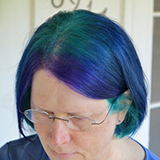Jo Walton’s “Thessaly” Trilogy
I recently finished reading Necessity, the third and final book in Jo Walton’s “Thessaly” trilogy. I had encountered Jo Walton’s writing previously in her novel Tooth and Claw, a fun and surprisingly thoughtful novel in the style of a Regency Romance with Dragons as the main characters. Her “Thessaly” trilogy is similarly thoughtful, but stylistically very different. It is set around an attempt to create Plato’s “Just City” as described in his Republic.
The Greek goddess Athene has heard the prayers of classicists and philosophers from ancient Greek times up to the mid 21st century, and transported them to the island of Santorini circa 1700 BCE, along with some robotic helpers. The idea is that when the volcano blows in a century or so, the city will be destroyed, thus preventing it from affecting History. They design and build the city. The classicists, now dubbed “Masters”, purchase 10,000 10-year old Greek speaking slave children from around the eastern Mediterranean over a few centuries and bring them to the island after the city is built by the robots, dubbed “Workers”. The Greek god Apollo has decided that he needs to learn some things about humans and decides to incarnate as a human child in this city as well. Five years in, Socrates is brought from his death bed to the city to teach rhetoric.
As you can imagine, things do not go as Plato envisioned. To start with, the children remember their earlier lives, which brings some differences into the city. Some were raised Christian, some Pagan, and not all are comfortable with the institution of Greek Pagan worship. Also, the “Festivals of Hera”, effectively sex by lot, are not universally popular, as the children have formed their own attachments. And bringing in Socrates to teach rhetoric without considering his historical tendencies to question everything is quite simply funny.
The books each end with a transformative event, setting up the situation to be explored in the following book. The third book ends with such an event, though it is indicated that it is the final book.
The first book, The Just City, sets up the scenario and carries us through the first ten years. The second, The Philosopher Kings, begins some fifteen years after the end of The Just City, and carries us through a few years of some of the children’s offspring growing up. The third book, Necessity, begins forty years after the second, and describes the events of a few momentous days.
Some of the classicists are historical figures, e.g. Cicero, Pico della Mirandola, Ficino, Benjamin Jowett, Ellen Francis Mason, Lucrezia Borgia, Plotinus, and others. Some are composites of people who have existed throughout history. The children, with the exception of Apollo, are simply children such as might have been born in ancient and early Christian times.
The characters are, I think, well drawn, and the ideas are examined thoroughly. The books were absorbing, thought provoking, and quite frankly hard to put down. I kept thinking about them during my daily activities. The books are fiction, of course, but the plot moves in a natural fashion. One can imagine different plot turns, but the plot Walton developed doesn’t disappoint, though it does surprise one now and then.
I highly recommend these books.
1. The Just City
Amazon – The Just City
2. The Philosopher Kings
Amazon – The Philosopher Kings
3. Necessity
Amazon – Necessity
